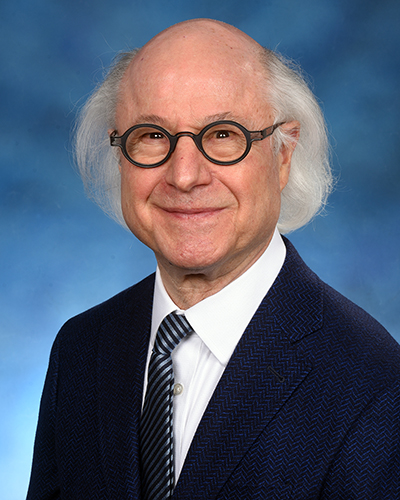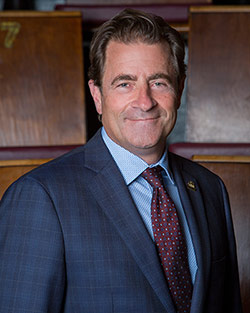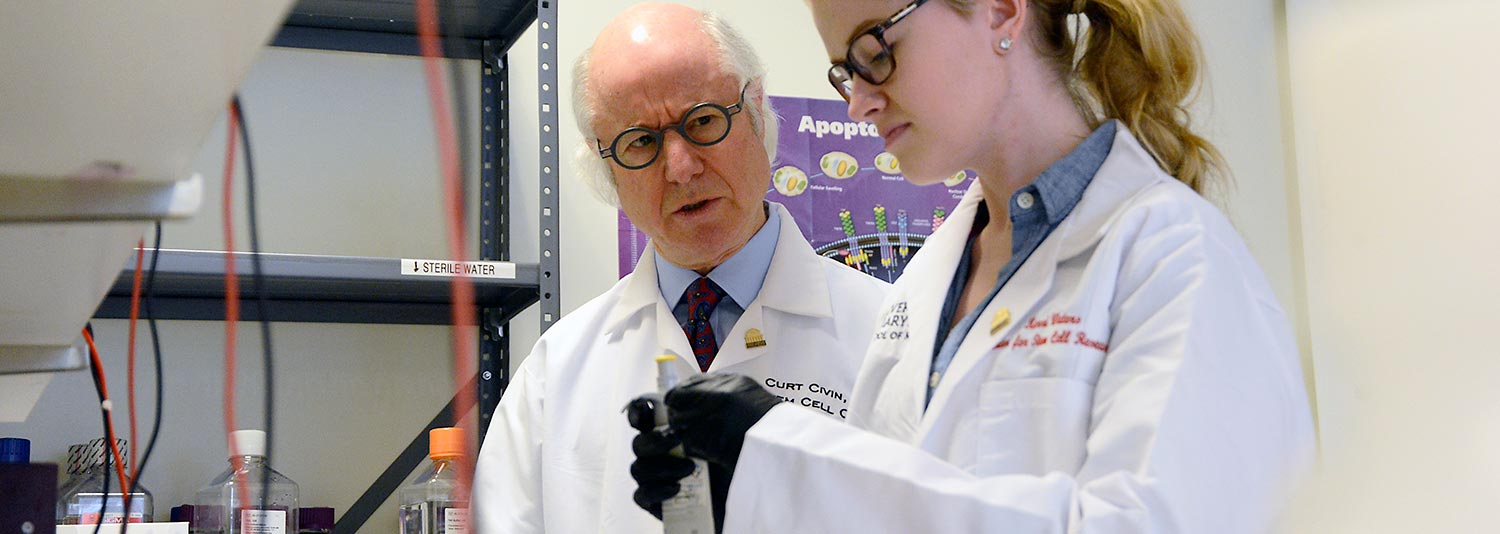March 17, 2023
Dr. Civin Will Focus on Major Research Projects as Director of the Center for Stem Cell Biology & Regenerative Medicine
 University of Maryland School of Medicine (UMSOM) Dean Mark T. Gladwin, MD, announced today that Curt I. Civin, MD, the Philip A. Zaffere Distinguished Professor in Regenerative Medicine and Professor of Pediatrics and Physiology, will step down from his position of Associate Dean for Research at UMSOM. Freed from the more global responsibilities inherent in the Associate Dean position, Dr. Civin will instead devote increased time and focus on leading novel stem cell and cancer research projects while pursuing his continuing role as Director of UMSOM’s Center for Stem Cell Biology & Regenerative Medicine.
University of Maryland School of Medicine (UMSOM) Dean Mark T. Gladwin, MD, announced today that Curt I. Civin, MD, the Philip A. Zaffere Distinguished Professor in Regenerative Medicine and Professor of Pediatrics and Physiology, will step down from his position of Associate Dean for Research at UMSOM. Freed from the more global responsibilities inherent in the Associate Dean position, Dr. Civin will instead devote increased time and focus on leading novel stem cell and cancer research projects while pursuing his continuing role as Director of UMSOM’s Center for Stem Cell Biology & Regenerative Medicine.
 “Dr. Civin has enjoyed a storied career as an academic triple-threat, highlighted by pioneering discoveries in cancer and stem cell research. His discoveries have had wide transformative clinical applications in hematopoietic stem cell transplantation, gene therapy and leukemia diagnosis, and he has made many leadership contributions in academic medicine as part of his renowned accomplishments,” said Dean Gladwin, who is also Vice President for Medical Affairs, University of Maryland, Baltimore, and the John Z. and Akiko K. Bowers Distinguished Professor. “The University of Maryland School of Medicine has valued and enjoyed his guidance on many school and Campus-wide initiatives during his 14-year tenure as Associate Dean for Research.”
“Dr. Civin has enjoyed a storied career as an academic triple-threat, highlighted by pioneering discoveries in cancer and stem cell research. His discoveries have had wide transformative clinical applications in hematopoietic stem cell transplantation, gene therapy and leukemia diagnosis, and he has made many leadership contributions in academic medicine as part of his renowned accomplishments,” said Dean Gladwin, who is also Vice President for Medical Affairs, University of Maryland, Baltimore, and the John Z. and Akiko K. Bowers Distinguished Professor. “The University of Maryland School of Medicine has valued and enjoyed his guidance on many school and Campus-wide initiatives during his 14-year tenure as Associate Dean for Research.”
Dr. Civin is a pioneer in cancer and stem cell research, internationally acclaimed for developing a technique to isolate stem cells from other blood cells. His groundbreaking discovery of the CD34 monoclonal antibody has had a major and enduring impact in basic research in stem cell and leukemia biology and has improved stem cell transplantation for thousands of patients. In addition, he accomplished the rare feat of making multiple further discoveries that are used today not only in laboratory research but also in clinical bone marrow stem cell transplantation and leukemia diagnosis.
Throughout his career, Dr. Civin has mentored a large number of talented scientists to pursue academic careers in translational research. He has lectured around the world, published more than 250 scientific articles and 40 book chapters, holds over 25 biomedical patents, and has served in leadership positions for multiple distinguished committees and editorial boards. He has received numerous honors and awards, including the National Inventor of the Year Award, Leukemia Lymphoma Society's Return of the Child Award, American Association of Blood Banks' Karl Landsteiner Award, Maryland Stem Cell Research Fund's John L. Kellerman Memorial Lecture, American Society of Hematology's Mentor Award, America's Top Doctors Award, American Association for the Advancement of Science's AAS Fellow Award, and an Honorary ScD from Amherst College. With Professor Toni Antalis, Dr. Civin co-leads the Cancer Biology Training Program. Now in its twelfth year, the NIH/NCI T32 grant funding this graduate and post-graduate translational research training program was renewed in 2022 with an impact score of 10.
Prior to joining UMSOM, Dr. Civin was Director of the Pediatric Oncology Division and led clinical, research and scholarly programs as the King Fahd Chair in Pediatric Oncology and the Herman & Walter Samuelson Chair in Cancer Research at Johns Hopkins University School of Medicine. In 2009, he was named the founding Director of UMSOM’s Center for Stem Cell Biology & Regenerative Medicine and Associate Dean for Research. Dr. Civin contributed to the highly successful integration of the faculty of three critically important research centers—the Institute for Bioscience and Biotechnology Research; the Center for Biomedical Engineering and Technology; and the Institute of Marine and Environmental Technology—and their resources with UMSOM and other schools of the University System of Maryland. Dr. Civin also has provided young faculty and trainees with personalized guidance and continuing funding opportunities—for example, by enhancing UMSOM benefits from the Maryland Stem Cell Research Fund and the Passano Foundation.
Currently, Dr. Civin leads the promising Pediatric Oncology Moonshot Research Program. From the State of Maryland’s $100 million Maryland Cancer Moonshot appropriation in 2022, $1 million was allocated to enhance UMSOM research on childhood cancers. This allowed Dr. Civin to launch a new seven-laboratory Maryland Pediatric Oncology Moonshot research program, where research efforts already have led to the creation of novel compounds likely to become new targeted pharmaceuticals for multiple childhood cancers. In addition, the program has employed innovative approaches to discover novel targets for childhood cancer treatments and found enhanced means to deliver biological as well as chemical therapeutics to sites such as the brain, where childhood cancer cells find sanctuary from therapeutics. These new discoveries position UMSOM for extended and enhanced State, Federal, and philanthropic funding for Pediatric Oncology research.
“It has been a privilege and an honor to contribute to the development of the School’s flourishing medical research environment over the past 14 years,” said Dr. Civin. “Nevertheless, with the exciting accomplishments and translational potential of both the new Pediatric Oncology Moonshot Program and the Center for Stem Cell Biology & Regenerative Medicine, it is time to focus my efforts on these specific missions, including my own lab’s research activities. I look forward to making additional and significant contributions to the School via this focused approach.”
About the Center for Stem Cell Biology and Regenerative Medicine
The Center for Stem Cell Biology & Regenerative Medicine opened in 2009 with Dr. Civin as its founding director. The mission of the Center is to discover, regenerate, cure and prevent disease. Today, the Center has over 80 members and provides a focal point for interaction, information, leadership, and facilitation of stem cell research and regenerative medicine applications throughout the University System of Maryland, with links to Johns Hopkins, Federal labs, and corporate researchers across the State of Maryland.
About the University of Maryland School of Medicine
Now in its third century, the University of Maryland School of Medicine was chartered in 1807 as the first public medical school in the United States. It continues today as one of the fastest growing, top-tier biomedical research enterprises in the world -- with 46 academic departments, centers, institutes, and programs, and a faculty of more than 3,000 physicians, scientists, and allied health professionals, including members of the National Academy of Medicine and the National Academy of Sciences, and a distinguished two-time winner of the Albert E. Lasker Award in Medical Research. With an operating budget of more than $1.3 billion, the School of Medicine works closely in partnership with the University of Maryland Medical Center and Medical System to provide research-intensive, academic, and clinically based care for nearly 2 million patients each year. The School of Medicine has nearly $600 million in extramural funding, with most of its academic departments highly ranked among all medical schools in the nation in research funding. As one of the seven professional schools that make up the University of Maryland, Baltimore campus, the School of Medicine has a total population of nearly 9,000 faculty and staff, including 2,500 students, trainees, residents, and fellows. The combined School of Medicine and Medical System (“University of Maryland Medicine”) has an annual budget of over $6 billion and an economic impact of nearly $20 billion on the state and local community. The School of Medicine, which ranks as the 8th highest among public medical schools in research productivity (according to the Association of American Medical Colleges profile) is an innovator in translational medicine, with 606 active patents and 52 start-up companies. In the latest U.S. News & World Report ranking of the Best Medical Schools, published in 2021, the UM School of Medicine is ranked #9 among the 92 public medical schools in the U.S., and in the top 15 percent (#27) of all 192 public and private U.S. medical schools. The School of Medicine works locally, nationally, and globally, with research and treatment facilities in 36 countries around the world. Visit medschool.umaryland.edu
Contact
Office of Public Affairs
655 West Baltimore Street
Bressler Research Building 14-002
Baltimore, Maryland 21201-1559
Contact Media Relations
(410) 706-5260

